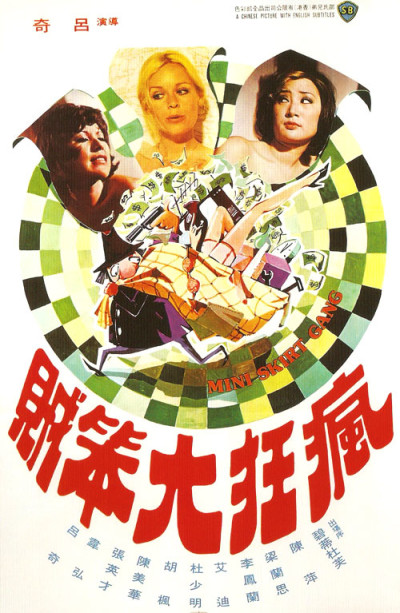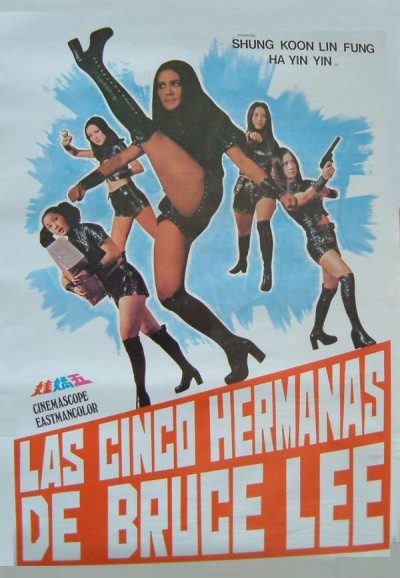★½
“So glad to have missed the seventies.”
 Dear god, this is awful. The only reason this 1974 film manages the dizzy heights of 1 1/2 stars, is the finale, which is actually a pretty decent burst of comedy action, highlighted by the heroine receiving inspiration from a poster advertising a Peking Opera production of the Mulan legend. Up until then, it’s a rancid piece of film-making, wasting the talents of those involved. Well, the actresses anyway, since Lui Kei provides no evidence, in either his direction or script, that there was any talent present to begin with.
Dear god, this is awful. The only reason this 1974 film manages the dizzy heights of 1 1/2 stars, is the finale, which is actually a pretty decent burst of comedy action, highlighted by the heroine receiving inspiration from a poster advertising a Peking Opera production of the Mulan legend. Up until then, it’s a rancid piece of film-making, wasting the talents of those involved. Well, the actresses anyway, since Lui Kei provides no evidence, in either his direction or script, that there was any talent present to begin with.
The gang in question are five female pickpockets, led by Ra Liao Liu (Danish actress Tove, whose presence in Hong Kong at the head of these thieves is never explained). When engaged on a job, they cross swords with a pair of bumbling male pickpockets, and inexplicably decide to join forces, even though the men are incompetent perverts. Cue the kind of behavior which would get you arrested these days, played by the movie in attempts at comedy which fall utterly flat. Man, if this is really what the decade was like, it must have been hell to be a woman. The rest of the film is filled with similarly “amusing” high-jinks, along with other scenes which serve little or no dramatic purpose, like the one where the good heart of Ra gets her deceived by a pair of con women, or an extended sequence where the whole gang pretend to be hookers. Oh, hold my aching sides, for I fear they may split.
Eventually, what passes for a meaningful plot finally shows up, as the gang rescue a woman from being forced into prostitution. Of course, the morality on view is a bit dubious, when their rescuee is then made pregnant by one of the men, who refuses to ‘fess up until he is made to believe he had sex with a leper. Yes, the laughs just never stop start in this Shaw Brothers production. Subsequently, her pimps come after them, and that’s what leads to the inadequate redemption of the big final battle, as well as an ending which offers no resolution, consisting entirely of the gang yelling out “We are the weird and crazy thieves!” Maybe that line lost something in translation from Chinese.
I thought my loathing might be strictly personal, but the first review I found called it, “The worst Shaw Brothers film I’ve ever seen, and I’ve seen over 200 of them.” So, not just me, then. Any screen presence Tove and her co-heroines possess, is almost entirely countered by the crude and largely incompetent approach, resulting in a mix of comedy and sexploitation that is neither funny nor sexy. Maybe times have changed, but if this ever seemed other than creepy, change can only be a good thing.
Dir: Lui Kei
Star: Birte Tove, Chen Ping, Nancy Leung, Lee Fung-Laan





 This is the story of three young women, sharing a house. There’s Kris (Pope), the sensible and apparently staid one, who works as a tax accountant; her flighty girlfriend Tara (Armstrong); and roommate Sammi (Baird). Tara and Sammi stumble into the aftermath of an apparent gangland shootout, exiting with a bag containing over $3 million in cash. The trio have very different ideas about what to do next, but Kris convinces them the best bet immediately, is to stash the bag in a lock-up, secured by three separate padlocks, with each holding one key, until they figure out if anyone is coming after the money. However, Sammi’s inability to keep her mouth shut proves disastrous, as her boyfriend is $50,000 in debt to local mob boss Kostas Jakobatos (Rhys-Davies), and sees an opportunity to clear the balance, and a lot more. Neither of the men have reckoned with Kris who, it turns out, is much more prepared for the situation than her two house-mates.
This is the story of three young women, sharing a house. There’s Kris (Pope), the sensible and apparently staid one, who works as a tax accountant; her flighty girlfriend Tara (Armstrong); and roommate Sammi (Baird). Tara and Sammi stumble into the aftermath of an apparent gangland shootout, exiting with a bag containing over $3 million in cash. The trio have very different ideas about what to do next, but Kris convinces them the best bet immediately, is to stash the bag in a lock-up, secured by three separate padlocks, with each holding one key, until they figure out if anyone is coming after the money. However, Sammi’s inability to keep her mouth shut proves disastrous, as her boyfriend is $50,000 in debt to local mob boss Kostas Jakobatos (Rhys-Davies), and sees an opportunity to clear the balance, and a lot more. Neither of the men have reckoned with Kris who, it turns out, is much more prepared for the situation than her two house-mates. Director Lam is responsible for insane cult classic, The Story of Ricky, and if this is more restrained, it’s only by comparison. Casino manager Chieh Ying (Wong) is gang-raped by five sleazebags – and, wouldn’t you know it, they’re the same guys who killed her father. Worse is to come, as a trip to the doctor reveals a rather nasty case of venereal disease, and after some melancholic wandering around which occupies the rest of the first half (and, to be frank, is rather boring), our heroine gets tore into the villains, extracting the titular payback. Though you know the old saying, “She who seeks vengeance, must first dig two graves”? That’s a severe understatement here, because this roaring rampage will end needing an entire cemetery, costing Chieh Ying almost everybody she cares about, from her uncle, a wheelchair bound kung-fu wizard (Lam, best known for the Mr. Vampire series), to her wannabe boyfriend (Wong).
Director Lam is responsible for insane cult classic, The Story of Ricky, and if this is more restrained, it’s only by comparison. Casino manager Chieh Ying (Wong) is gang-raped by five sleazebags – and, wouldn’t you know it, they’re the same guys who killed her father. Worse is to come, as a trip to the doctor reveals a rather nasty case of venereal disease, and after some melancholic wandering around which occupies the rest of the first half (and, to be frank, is rather boring), our heroine gets tore into the villains, extracting the titular payback. Though you know the old saying, “She who seeks vengeance, must first dig two graves”? That’s a severe understatement here, because this roaring rampage will end needing an entire cemetery, costing Chieh Ying almost everybody she cares about, from her uncle, a wheelchair bound kung-fu wizard (Lam, best known for the Mr. Vampire series), to her wannabe boyfriend (Wong). For years, an assassin known as “Jackal”, has eluded all efforts at capture, taking out targets before vanishing without trace. However, it seems that retirement is close, when a note is found, apparently left by the killer. This indicates that they are tired of the chase, and will be in a town’s low-rent hotel, waiting for the police. The cop (Han) who has been hunting Jackal is, understandably, wary and suspects a trick, but sets up a stakeout in the hotel to see what unfolds. However, already in one of the rooms there is K-Pop superstar Choi Hyun (Kim)., who had been hoping to hide out for a bit of peace and quite, only to be kidnapped by a rookie killer (Song), hired by his jilted lover. She’s apparently not very good at her job, especially after Choi convinces her he isn’t actually the star, but a celebrity lookalike. Meanwhile, a local cop (Oh) has been drafted in to help with the stakeout, and the hotel staff are proving rather less than helpful, treating the stakeout as a bonus cash-cow to be milked, rather than a chance to help the authorities.
For years, an assassin known as “Jackal”, has eluded all efforts at capture, taking out targets before vanishing without trace. However, it seems that retirement is close, when a note is found, apparently left by the killer. This indicates that they are tired of the chase, and will be in a town’s low-rent hotel, waiting for the police. The cop (Han) who has been hunting Jackal is, understandably, wary and suspects a trick, but sets up a stakeout in the hotel to see what unfolds. However, already in one of the rooms there is K-Pop superstar Choi Hyun (Kim)., who had been hoping to hide out for a bit of peace and quite, only to be kidnapped by a rookie killer (Song), hired by his jilted lover. She’s apparently not very good at her job, especially after Choi convinces her he isn’t actually the star, but a celebrity lookalike. Meanwhile, a local cop (Oh) has been drafted in to help with the stakeout, and the hotel staff are proving rather less than helpful, treating the stakeout as a bonus cash-cow to be milked, rather than a chance to help the authorities. Four years after Bruce Lee’s death, and film-makers were still trying to fool moviegoers into believing their product had some connection to kung-fu’s first global star. Not sure where the deception occurred, as the print here simply overlays the new title over the (still-legible) Hong Kong one,
Four years after Bruce Lee’s death, and film-makers were still trying to fool moviegoers into believing their product had some connection to kung-fu’s first global star. Not sure where the deception occurred, as the print here simply overlays the new title over the (still-legible) Hong Kong one,  It’s 1993, and the peace process in Northern Ireland is cautiously inching forward – though there are some who prefer a more robust method of rebellion, shall we say. Among them is Collette McVeigh (Riseborough) whose little brother was killed by the British Army when she was 12. Along with her brothers Gerry (Gillen, whom you’ll know as Littlefinger from Game of Thrones) and Connor, she is part of the armed struggle, until a mission to plant a bomb in London leads to her capture. MI5 officer Mac (Owen) gives her a stark choice: face a long stretch in prison, separated from her children, or become an informer on her own family. Collette chooses the later, perhaps influenced by Mac showing her it was an IRA sniper who killed her brother. But it soon becomes clear more is at play, with Mac’s boss (Anderson) apparently intent on sacrificing Collette, in order to protect another, more valuable asset.
It’s 1993, and the peace process in Northern Ireland is cautiously inching forward – though there are some who prefer a more robust method of rebellion, shall we say. Among them is Collette McVeigh (Riseborough) whose little brother was killed by the British Army when she was 12. Along with her brothers Gerry (Gillen, whom you’ll know as Littlefinger from Game of Thrones) and Connor, she is part of the armed struggle, until a mission to plant a bomb in London leads to her capture. MI5 officer Mac (Owen) gives her a stark choice: face a long stretch in prison, separated from her children, or become an informer on her own family. Collette chooses the later, perhaps influenced by Mac showing her it was an IRA sniper who killed her brother. But it soon becomes clear more is at play, with Mac’s boss (Anderson) apparently intent on sacrificing Collette, in order to protect another, more valuable asset. It’s really the finale which makes this stand out – not necessarily for its qualities (though it’s far from bad), more for the batshit insanity. It sees ex-cop Michelle Yip (Yeoh) storm a construction site in an armoured car, to rescue the coffin containing the body of a colleague, which has been suspended from a crane by the bad guy. How the hell did we get here? Good question. It all starts on a plane back from Japan, where among the passengers are Yip, Interpol agent Peter Yamamoto (Sanada, recently seen creating doomsday diseases in Helix) and security guard Michael Wong (Wong – a lot of thought clearly went into that character). On the flight, there’s a hijack, in an attempt to free a killer being extradited to Hong Kong; our heroic trio foil it, killing the hijackers. But that just brings down the wrath of the rest of the gang, who vow to take their revenge on the people who killed their colleagues. And they really don’t care who gets in their way, as a mass gun-battle at a night-club shows – it also gets Yip taken off the case.
It’s really the finale which makes this stand out – not necessarily for its qualities (though it’s far from bad), more for the batshit insanity. It sees ex-cop Michelle Yip (Yeoh) storm a construction site in an armoured car, to rescue the coffin containing the body of a colleague, which has been suspended from a crane by the bad guy. How the hell did we get here? Good question. It all starts on a plane back from Japan, where among the passengers are Yip, Interpol agent Peter Yamamoto (Sanada, recently seen creating doomsday diseases in Helix) and security guard Michael Wong (Wong – a lot of thought clearly went into that character). On the flight, there’s a hijack, in an attempt to free a killer being extradited to Hong Kong; our heroic trio foil it, killing the hijackers. But that just brings down the wrath of the rest of the gang, who vow to take their revenge on the people who killed their colleagues. And they really don’t care who gets in their way, as a mass gun-battle at a night-club shows – it also gets Yip taken off the case. I’m on the fence with regard to the Japanese uber-gore films, most notably, by the Sushi Typhoon studio, which have achieved renown (or infamy) of late. While some (
I’m on the fence with regard to the Japanese uber-gore films, most notably, by the Sushi Typhoon studio, which have achieved renown (or infamy) of late. While some ( This is definitely a case where less would have been more, and with a more enthusiastic hand on the editor’s knife, this could have become a decent eighty-minute feature – and possibly an even better 50-minute one. Kamikura does often demonstrate an awareness and acceptance of exactly how ludicrous the entire scenario is, and the film is at its best when wholeheartedly embracing its own insanity. For instance, each of the cyborg athletes’ talents is influenced by their sport: Hitomi Oka is a tennis-player, so whacks people with an over-sized, pneumatic racket, and lobs exploding tennis-balls at them. Additional helpings of that kind of imaginative lunacy – and considerably less tied-up schoolgirls being prodded or whipped – would certainly have made for a more entertaining end product.
This is definitely a case where less would have been more, and with a more enthusiastic hand on the editor’s knife, this could have become a decent eighty-minute feature – and possibly an even better 50-minute one. Kamikura does often demonstrate an awareness and acceptance of exactly how ludicrous the entire scenario is, and the film is at its best when wholeheartedly embracing its own insanity. For instance, each of the cyborg athletes’ talents is influenced by their sport: Hitomi Oka is a tennis-player, so whacks people with an over-sized, pneumatic racket, and lobs exploding tennis-balls at them. Additional helpings of that kind of imaginative lunacy – and considerably less tied-up schoolgirls being prodded or whipped – would certainly have made for a more entertaining end product. ★★★★
★★★★ Crackle is the streaming content subsidiary of Sony – it has been around for a while, but we only became aware of it last December, when a new widget popped up on our Apple TV. Think of it as a little like an advert-supported version of Netflix; you can watch for free, whenever you want, but you have to “pay” by sitting through commercials (during which the FF option on your remote is disabled. Bastards!). The library of movies and shows offered is based around that studio’s library, and has a number of entries for action heroine fans. Bonus points, not just for having Run Lola Run, but in the subtitled version; they also have Ultraviolet: Code 044, the anime spin-off from Milla Jovovich’s action-horror film, though that is only available dubbed. We’ll get to that later, I imagine, but the first thing to leap out at us was this original series, about a pair of female assassins. It’s certainly not to be confused with the Samuel L. Jackson movie or Benjamin Brett show.
Crackle is the streaming content subsidiary of Sony – it has been around for a while, but we only became aware of it last December, when a new widget popped up on our Apple TV. Think of it as a little like an advert-supported version of Netflix; you can watch for free, whenever you want, but you have to “pay” by sitting through commercials (during which the FF option on your remote is disabled. Bastards!). The library of movies and shows offered is based around that studio’s library, and has a number of entries for action heroine fans. Bonus points, not just for having Run Lola Run, but in the subtitled version; they also have Ultraviolet: Code 044, the anime spin-off from Milla Jovovich’s action-horror film, though that is only available dubbed. We’ll get to that later, I imagine, but the first thing to leap out at us was this original series, about a pair of female assassins. It’s certainly not to be confused with the Samuel L. Jackson movie or Benjamin Brett show. There are six episodes, but they’re barely 20 minutes each, discounting adverts, and by the time you remove the credits, and “previously/next time on Cleaners” sections, it’s basically a single feature. Maybe I’ll get round to editing it together in exactly that fashion. There’s a hint of Tarantino in the fast-paced dialogue, as the characters snark back and forth at each other – my favourite line was Roxie’s response, after Veronica had expounded on some topic: “Jesus! What did you have for breakfast? Wikipedia?” Leyden throws on large helpings of style, which is something of an acquired taste: in the first episode, it seemed more of a chore than a pleasure, but as the show wore on, he either restrained himself better or we grew used to it.
There are six episodes, but they’re barely 20 minutes each, discounting adverts, and by the time you remove the credits, and “previously/next time on Cleaners” sections, it’s basically a single feature. Maybe I’ll get round to editing it together in exactly that fashion. There’s a hint of Tarantino in the fast-paced dialogue, as the characters snark back and forth at each other – my favourite line was Roxie’s response, after Veronica had expounded on some topic: “Jesus! What did you have for breakfast? Wikipedia?” Leyden throws on large helpings of style, which is something of an acquired taste: in the first episode, it seemed more of a chore than a pleasure, but as the show wore on, he either restrained himself better or we grew used to it. After the genuinely impressive bleakness of Assassin Lovers, the series comes crashing back to earth with a splat like a rotten tomato for this entry, which fizzles out early on, and then manages to lumber on for another 45 minutes. Rei (Tachihara) spends her time between missions hanging out at a gay bar, and rescues one of the rent boys, Mitsusu (Kitagawa), who ply their trade there after a vicious assault – accompanied, it has to be said, by the least appropriate music in the history of cinematic homosexual rape. He ends up moving in with her, to the latest in a series of unfurnished apartments provided by Section Zero, and the two damaged individuals start creating a life, of sorts, for themselves. However, there’s a serial killer, apparently with a deep hatred of men, operating in the area, and Rei is given the mission of tracking down and eliminating the psycho.
After the genuinely impressive bleakness of Assassin Lovers, the series comes crashing back to earth with a splat like a rotten tomato for this entry, which fizzles out early on, and then manages to lumber on for another 45 minutes. Rei (Tachihara) spends her time between missions hanging out at a gay bar, and rescues one of the rent boys, Mitsusu (Kitagawa), who ply their trade there after a vicious assault – accompanied, it has to be said, by the least appropriate music in the history of cinematic homosexual rape. He ends up moving in with her, to the latest in a series of unfurnished apartments provided by Section Zero, and the two damaged individuals start creating a life, of sorts, for themselves. However, there’s a serial killer, apparently with a deep hatred of men, operating in the area, and Rei is given the mission of tracking down and eliminating the psycho.